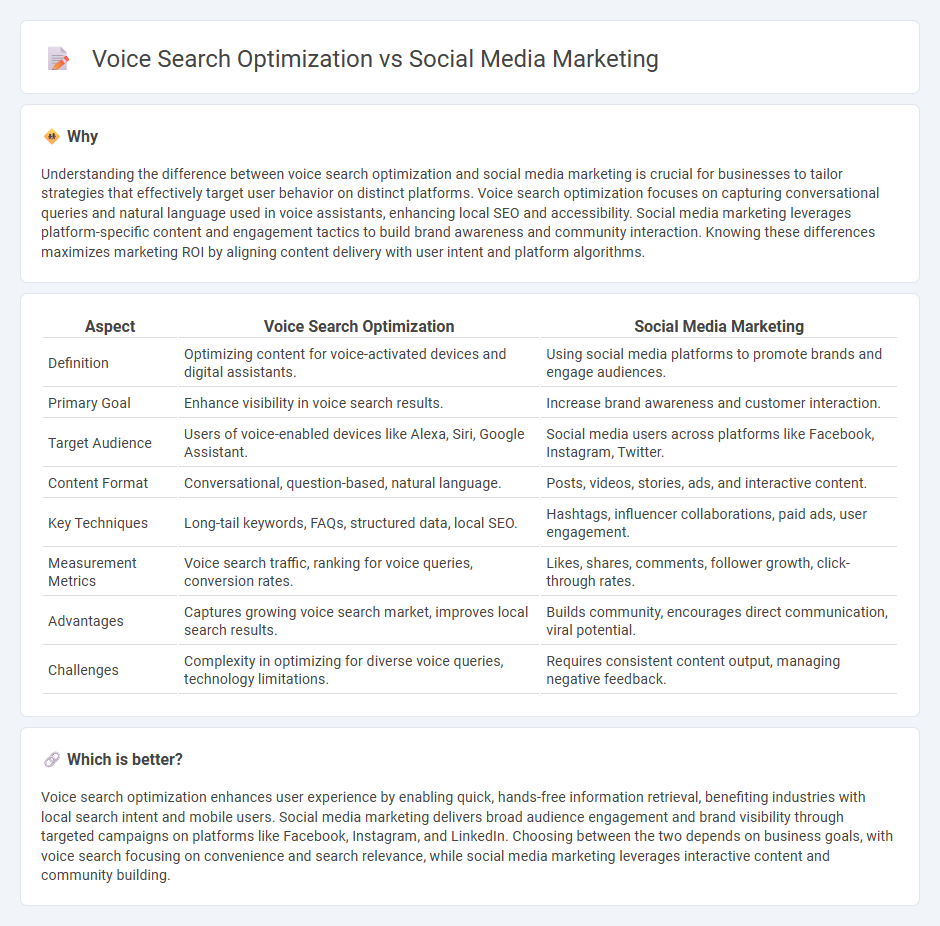
Voice search optimization enhances user experience by enabling natural language queries and improving local SEO, driving increased website traffic from voice-enabled devices. Social media marketing leverages platforms like Facebook and Instagram to engage target audiences, boost brand awareness, and generate leads through tailored content and advertisements. Discover more strategies to elevate your marketing efforts through these dynamic channels.
Why it is important
Understanding the difference between voice search optimization and social media marketing is crucial for businesses to tailor strategies that effectively target user behavior on distinct platforms. Voice search optimization focuses on capturing conversational queries and natural language used in voice assistants, enhancing local SEO and accessibility. Social media marketing leverages platform-specific content and engagement tactics to build brand awareness and community interaction. Knowing these differences maximizes marketing ROI by aligning content delivery with user intent and platform algorithms.
Comparison Table
| Aspect | Voice Search Optimization | Social Media Marketing |
|---|---|---|
| Definition | Optimizing content for voice-activated devices and digital assistants. | Using social media platforms to promote brands and engage audiences. |
| Primary Goal | Enhance visibility in voice search results. | Increase brand awareness and customer interaction. |
| Target Audience | Users of voice-enabled devices like Alexa, Siri, Google Assistant. | Social media users across platforms like Facebook, Instagram, Twitter. |
| Content Format | Conversational, question-based, natural language. | Posts, videos, stories, ads, and interactive content. |
| Key Techniques | Long-tail keywords, FAQs, structured data, local SEO. | Hashtags, influencer collaborations, paid ads, user engagement. |
| Measurement Metrics | Voice search traffic, ranking for voice queries, conversion rates. | Likes, shares, comments, follower growth, click-through rates. |
| Advantages | Captures growing voice search market, improves local search results. | Builds community, encourages direct communication, viral potential. |
| Challenges | Complexity in optimizing for diverse voice queries, technology limitations. | Requires consistent content output, managing negative feedback. |
Which is better?
Voice search optimization enhances user experience by enabling quick, hands-free information retrieval, benefiting industries with local search intent and mobile users. Social media marketing delivers broad audience engagement and brand visibility through targeted campaigns on platforms like Facebook, Instagram, and LinkedIn. Choosing between the two depends on business goals, with voice search focusing on convenience and search relevance, while social media marketing leverages interactive content and community building.
Connection
Voice search optimization enhances social media marketing by improving content discoverability through natural language queries on platforms like Instagram and Facebook. Integrating voice search strategies boosts engagement as users employ voice assistants to find trending hashtags, brands, and social content. This synergy drives targeted traffic and elevates brand visibility in real-time social media interactions.
Key Terms
**Social Media Marketing:**
Social media marketing leverages platforms such as Facebook, Instagram, and LinkedIn to build brand awareness, engage with target audiences, and drive sales through content strategy, paid advertising, and influencer partnerships. Key metrics including engagement rate, click-through rate, and conversion rate highlight the effectiveness of campaigns in real-time. Explore advanced social media marketing strategies and tools to maximize your brand's online presence and ROI.
Engagement
Social media marketing drives engagement through targeted content, interactive features, and real-time communication, fostering strong community connections on platforms like Facebook, Instagram, and Twitter. Voice search optimization improves user interaction by enabling seamless, hands-free queries, enhancing accessibility and convenience for platforms like Google Assistant and Alexa. Discover effective strategies to boost your engagement by mastering both social media marketing and voice search optimization.
Content Strategy
Social media marketing drives engagement by leveraging platform-specific content strategies that prioritize visual and interactive elements to capture audience attention. Voice search optimization requires a content approach centered on natural language, conversational keywords, and question-based queries to align with voice assistants like Alexa and Google Assistant. Explore how integrating these strategies can enhance your brand's digital presence effectively.
Source and External Links
What is social media marketing (SMM)? - Social media marketing uses platforms like Instagram, Facebook, TikTok, YouTube, and Pinterest to connect with audiences to build brands, increase sales, and drive website traffic by posting engaging content that sparks user interaction.
How to Build Your Social Media Marketing Strategy - Social media marketing promotes brands and products through platforms such as Instagram, Facebook, and X, focusing increasingly on dynamic short-form videos and influencer marketing to engage consumers and drive sales in 2025.
What is a social media marketing strategy? - Effective social media marketing strategies include clear goals and KPIs, optimized influencer marketing, AI and automation for content and analytics, and in-depth reporting to prove ROI and success over time.
 dowidth.com
dowidth.com